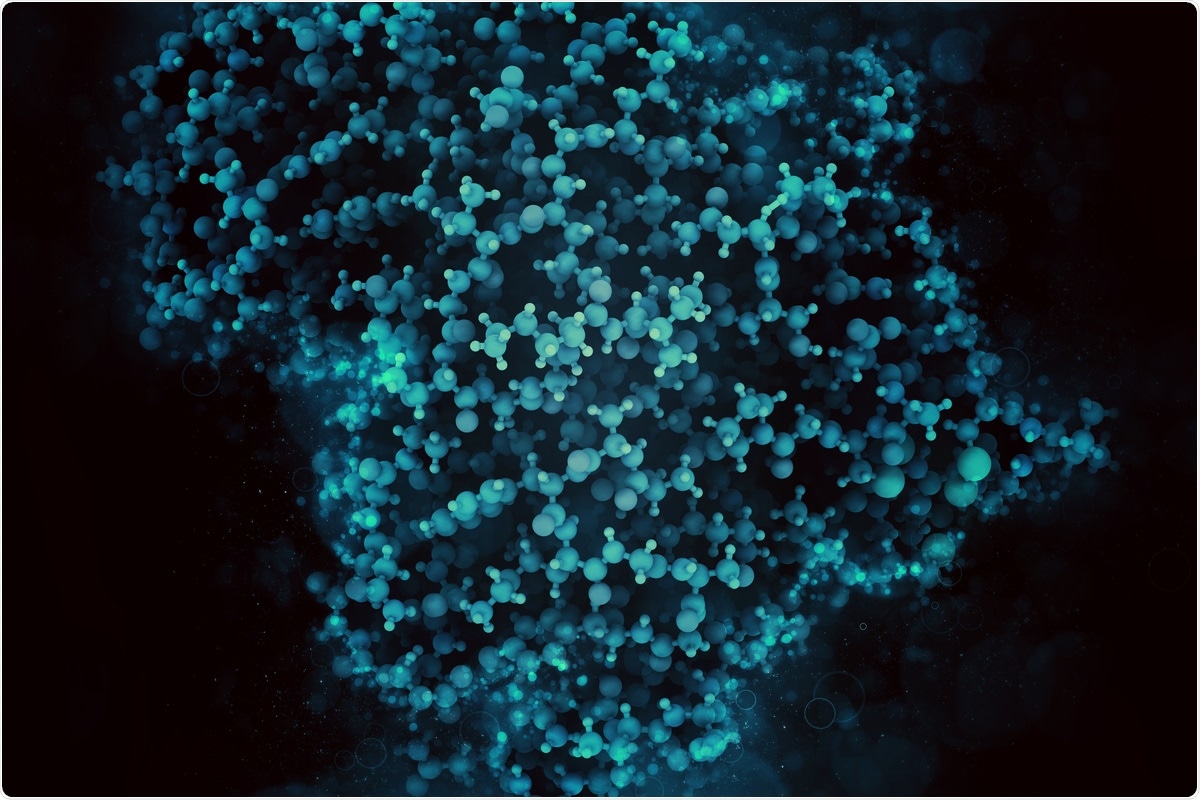A team of scientists from the United States and Sweden has recently demonstrated that increased levels of a proinflammatory cytokine, angiopoietin-2, is responsible for hypercoagulation observed in severe coronavirus disease 2019 (COVID-19) patients. The study is currently available on the medRxiv* preprint server.

Background
Severe acute respiratory syndrome coronavirus 2 (SARS-CoV-2) – the causative pathogen of COVID-19 – is associated with a number of symptoms, ranging from mild fever and cough to severe respiratory distress with bilateral pneumonia and cardiovascular complications. Despite the use of anti-thrombotic drugs as a part of the standard of care treatment, hyperactivation of the coagulation system has been found to associate with poor prognosis in severe COVID-19 patients.
An elevated plasma level of angiopoietin-2 (ANG2), which is a proinflammatory cytokine, is considered to be a strong predictor of mortality in patients with acute respiratory distress syndrome (ARDS) and sepsis. Some recent evidence has shown that the plasma level of ANG2 is also associated with COVID-19 severity.
In the current study, the scientists evaluated whether an elevated plasma level of ANG2 in critically ill COVID-19 patients can modulate the coagulation system by inhibiting thrombomodulin-mediated activation of protein C. Thrombomodulin is expressed on the endothelial cell surface where it binds thrombin and inhibits the intrinsic coagulation process.
Current study design
The study was conducted on 20 critically ill COVID-19 patients admitted to the intensive care unit (ICU) for more than 10 days. The plasma samples were collected at 2 time points: 4 days post-admission and 10–14 days post-admission. As a control, samples from healthy individuals were also collected for comparison.
In addition, the scientists have conducted in vivo animal experiments and in vitro assays to investigate the mechanism of action of ANG2 in modulating coagulation.
Important observations
Overall, an elevated ANG2 level was observed in plasma samples of all critically ill COVID-19 patients. A significantly high ANG2 level was found to be associated with the risk of organ failure and death.
To investigate whether ANG2 level is associated with hypercoagulation, the scientists checked several markers of the intrinsic coagulation process. Specifically, significantly elevated levels of platelet, D-dimer, and von Willebrand factor and significantly reduced levels of ADAMTS13 were observed in all COVID-19 patients. ADAMTS13 is a metalloproteinase that inhibits the coagulation activities of von Willebrand factor by inducing proteolytic degradation. Moreover, the level of ANG2 was found to inversely correlate with the ADAMTS13 level. These observations indicate that the pro-coagulation process is significantly impaired in these patients and that ANG2 plays a crucial role in mediating hypercoagulation, which is a frequently observed symptom in critically ill COVID-19 patients.
By analyzing thromboelastographic findings of the patients, the scientists have observed that the maximum clot strength is significantly associated with ANG2 level and mortality.
In vivo and in vitro findings
To investigate the mode of action of ANG2, the scientists have intraperitoneally administered ANG2 in mice and observed that ANG2 significantly reduces tail bleeding time. In contrast, experimentally modified mice lacking ANG2 have shown significantly increased bleeding time. Furthermore, they have observed that ANG2 has high binding affinity for thrombomodulin and that ANG2 induces the shedding of thrombomodulin from the endothelial cell surface.
By supplementing human plasma samples with thrombomodulin and ANG2 and performing thromboelastography, they have observed that ANG2 significantly inhibits the anti-coagulation activities of thrombomodulin. Moreover, ANG2 has been shown to increase the clot strength by inhibiting thrombomodulin.
It is known that thrombomodulin together with thrombin activates protein C (activated protein C or APC), leading to induction of fibrinolysis and inhibition of thrombosis and inflammation. The in vitro assays performed in this study have shown that ANG2 significantly reduces thrombomodulin-mediated activation of protein C. Moreover, significantly decreased levels of APC have been observed in all COVID-19 patients.
Study significance
The study findings demonstrate that an increased level of ANG2, a proinflammatory cytokine, in COVID-19 patients is associated with disease severity, hypercoagulation, and mortality. Given these observations, the scientists believe that therapeutic inhibition of ANG2 can be a potential approach for treating severe COVID-19 patients, as well as for alleviating cardiovascular complications associated with the disease.
*Important Notice
medRxiv publishes preliminary scientific reports that are not peer-reviewed and, therefore, should not be regarded as conclusive, guide clinical practice/health-related behavior, or treated as established information.
https://news.google.com/__i/rss/rd/articles/CBMieWh0dHBzOi8vd3d3Lm5ld3MtbWVkaWNhbC5uZXQvbmV3cy8yMDIxMDExOC9Bbmdpb3BvaWV0aW4tMi1pcy1hLWNydWNpYWwtZGV0ZXJtaW5hbnQtb2YtQ09WSUQtMTktcHJvZ25vc2lzLXN0dWR5LWZpbmRzLmFzcHjSAX1odHRwczovL3d3dy5uZXdzLW1lZGljYWwubmV0L2FtcC9uZXdzLzIwMjEwMTE4L0FuZ2lvcG9pZXRpbi0yLWlzLWEtY3J1Y2lhbC1kZXRlcm1pbmFudC1vZi1DT1ZJRC0xOS1wcm9nbm9zaXMtc3R1ZHktZmluZHMuYXNweA?oc=5
2021-01-18 16:22:00Z
CAIiEJ1sVreCww0_7NibSdiiy80qMwgEKioIACIQZdRflS9INK7zM5FkBi3R3CoUCAoiEGXUX5UvSDSu8zORZAYt0dwwr47MBg
Bagikan Berita Ini














0 Response to "Angiopoietin-2 is a crucial determinant of COVID-19 prognosis, study finds - News-Medical.Net"
Post a Comment